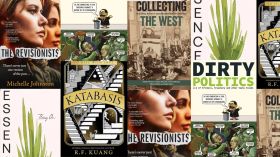President Theodore Roosevelt read a book a day, and increased this to two or three when he had a quiet night. Agatha Christie read 200 books every year. Even Facebook founder Mark Zuckerberg gets through a book a fortnight.
But for many of people the pile of books on the bedside table – or the Amazon wishlist – just seems to grow as out attentions are diverted by screens, social media and a work culture that never switches off.
Vowing to read more books is a popular new year’s resolution, but by mid-January it often goes the way of new workout clothes and healthy recipe books: buried under the weight of good intentions.
Research has shown that reading can make you more relaxed, empathetic and mentally fit. One 2009 study by Sussex University researchers showed that reading can reduce stress by as much as 68 per cent – working faster than listening to music, going for a walk or sipping tea.
‘It really doesn’t matter what book you read, by losing yourself in a thoroughly engrossing book you can escape from the worries and stresses of the everyday world and spend a while exploring the domain of the author’s imagination,’ cognitive neuropsychologist David Lewis told The Telegraph.
The relaxation benefits are also said to linger – unlike checking social media which gives us a rush of dopamine each time we spot a new like, comment, retweet or email sitting in our inbox, but quickly dissipates.
Reading is an active form of relaxation, as it continues to ignite our imagination and stimulate our minds. ‘You are switching off, but your brain is active,’ said bibliotherapist Sonya Tsakalakis. ‘Reading is a mindfulness activity. As we read, it is all consuming. We are transported to another world and the idea of self recedes.’
If you are struggling to make reading a priority, we have compiled 20 ways to get you reading more and better.
Read: How reading helps the world
-
Be a quitter
That epic novel that you are begrudgingly working your way through? You have permission not to finish it. Life is too short to read books that don’t hold our attention. As Hari Kunzru put it recently in the New York Times Book Review: ‘I used to force myself to finish everything I started, which I think is quite good discipline when you’re young, but once you’ve established your taste, and the penny drops that there are only a certain number of books you’ll get to read before you die, reading bad ones becomes almost nauseating.’
And Sam Twyford-Moore, host of The Rereaders podcast, said he barely finishes anything. ‘I’m a big believer in giving up hope on bad books, but also I’m a very digressive reader – I’ll read one thing, and then immediately think of something else. That means I read pretty widely, if not in a linear, expected fashion. Sometimes it will take me months to finish a book, but I’ll be reading three or more at any one time. I don’t think I have a very good attention span, which actually comes in handy.’
-
Keep a stack of books
That huge pile of unread novels on your bedside table, threatening to smother you in your sleep? It actually helps you remember to read. A visual cue can help guilt you into reading, which isn’t such a bad thing, right?
-
Open a Goodreads account
Like Facebook for readers, Goodreads lets you keep lists of books you’ve read and want to read, and discover, review and discuss new books. It connects to your Facebook account so you can follow what your friends are reading, and find new recommendations.
-
Find a few lists
There are heaps of ways to find book recommendations, but one way is to keep an eye on the bestseller lists. Most popular books are bestsellers for a reason, so you can usually trust that they will hold your attention. You can also work your way through the shortlists (or longlists, if you’re keen!) for major literary awards, and most booksellers publish a list of new or popular titles.
-
Get rid of social media
Instead of scrolling through Instagram looking at pictures of other people’s breakfasts or the banality of Twitter, pick up your book. The average person spends approximately 116 minutes each day on social media. And while it might be important to see what your ex-girlfriend’s new husband’s sister’s baby looks like, we guarantee that a book will make you feel happier and more relaxed that a Facebook stalking session.
-
Don’t kid yourself that scrolling is reading
‘But I already read!’ you shout. ‘I read the news online everyday, and I read articles from the New York Times and the Guardian!’ Sorry to disappoint you, but it’s not the same. The internet is killing our attention span and, while reading longform articles is better than reading tweets, no form of reading is as immersive or restorative as reading a full length book.
-
A little bit, often
You don’t need a solid hour every day to read a book. You don’t even need a solid twenty minutes: just use reading to fill the gaps between your other activities. Waiting in a queue? Pull a paperback out of your bag. Stuck on a train? Read on your e-reader. Waiting for the kettle to boil? Read a couple of pages. Sure, reading in snatched moments is not going to be as immersive as a solid chunk of reading time, but it all still counts.
-
Use your smartphone
If carrying a book everywhere sounds like hard work, then utilise the device that you already carry everywhere: your phone. You can download books onto your phone through iBooks on Apple devices and Google Play Books on Android. Easy to read on the go.
-
Set a goal
If you are the kind of person who likes goal-setting, then set yourself a reading goal. It might be twenty pages a day, or twenty books a year. Start really low and achievable so you don’t get disheartened, then slowly set the bar higher until your habit is established.
-
Between the sheets
Reading before bed is the most popular time to read, as it is the perfect way to still your mind and body and prepare for sleep. Although it might be best to stay away from e-readers and smartphones when you’re between the sheets: researchers at Harvard Medical School have found that the blue light from electronic devices makes it harder to fall asleep. A 2014 study found that participants who read e-books “took longer to fall asleep and had reduced evening sleepiness, reduced melatonin secretion, later timing of their circadian clock and reduced next-morning alertness than when reading a printed book,” according to Anne-Marie Chang, a neuroscientist at Brigham and Women’s Division of Sleep and Circadian Disorders who co-authored the study.
-
Try audiobooks
If your eyes are tired or your hands are busy you can still read with your ears. Audiobooks have surged in popularity over the past few years, and many major bestsellers are now available as an audiobook. Apps such as Audible make it easy to download books and listen on the go, and some e-readers will even sync with your Audible account, so you can switch between an ebook and audiobook version of the same story with ease.
-
Read faster…
Don’t be afraid of the skim, especially if you are reading non-fiction. There is nothing wrong with skimming a book and choosing the parts that are relevant to you. If you are reading fiction, however, and want to increase your reading speed, there are plenty of online tools and tricks to learn speed reading.
-
…or read slower
If you are naturally a slower reader, then don’t fight it and try to rush through books. You are probably retaining more information and gaining more than a reader who whizzes through book after book. Embrace your natural reading style.
-
Read what you want
Again, embrace your own style. If you love romances featuring vampires and werewolves, then don’t feel that you have to read the latest political memoir, and vice versa. Different genres exist for a reason, so don’t be ashamed to like what you like. If you find an author that you love, feel free to read everything they have ever written, or every book in a specific niche.
That said, it never hurts to expand your horizons occasionally. You don’t have to finish every book you start, so trying new genres or authors doesn’t have to be a big commitment. And you can read widely within your particular interest: if you are a huge sci-fi fan, then track down some sci-fi classics from the 50s, as well as the modern-day stories that you love.
-
Read multiple books
There are no rules saying you must read one book at a time. Keep one in your bag for commutes and queues, one next to your bed for late night reading and one in your living room. Keeping track of multiple books is not as confusing as it sounds – if you can keep track of multiple TV shows, projects, and social media accounts, then you can multi-task your book reading.
-
Mark it up
If you really want to get a lot out of the book you are reading, then you have to take notes. Reading a book with a pencil in hand, scribbling notes in the margin and underlining particularly poignant lines is a way to go deeper and consolidate your thoughts. It can also be particularly therapeutic: Tsakalakis recommends that readers try to read ‘with an intent and purpose’. She also suggests a “reader’s notebook,” where readers can note down passages that they love or ideas that resonate with them.
-
Up next
If you finish a book without one up next and ready to read, then you will inevitably end up spending your reading time scrolling through social media and re-watching Breaking Bad instead of expanding your mind through literature. Buy books that you want to read, reserve books at the library, keep you Goodreads list updates, you’ll always have a book waiting in the wings.
-
Beg, borrow and steal
Well, maybe don’t steal them, but we’ve all got a few titles on our bookshelves with other people’s names on them, right? The ones that we meant to give back… six years ago? When you visit friends, peruse their bookshelves and ask to borrow any that take your fancy (and if your friends don’t own any books, get better friends).
Ask for books, or gift cards to bookstores, for birthday or Christmas presents. And share the love: books make excellent gifts for all ages, for all occasions. They don’t have to be expensive either: op shops, secondhand bookstores, ex-library books and even cheap paperbacks from the supermarket can be excellent reads.
-
Join a book club
Book clubs are a great way to stay accountable, find recommendations, and to general hang out with likeminded people (also, wine). Many libraries, bookstores and adult education centres set up bookclubs, so have a hunt online for one that suits you.
-
Join the library
Libraries offer so much these days – coding clubs, language classes, freelance workspaces – that it is easy to forget that they actually house hundreds of thousands of books, all free for the borrowing. And librarians are a wealth of knowledge for book recommendations, so ask away. You can also often request certain books, order books from other branches and reserve your favourites. Many libraries also host author talks too.






